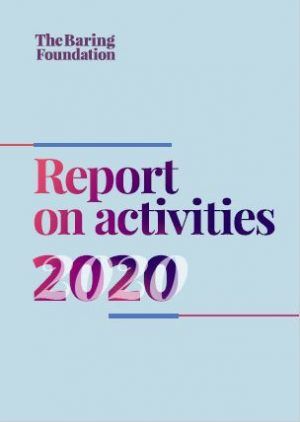The truth is, no one of us can be free until everybody is free.
Maya Angelou
It is a truism that 2020 has been a difficult and traumatic year. This has not just been about the impact of the Covid-19 pandemic. It has also been about the emergence of the urgent need to address issues of racial justice and anti-racism and the challenge from the Black Lives Matter protests.
Like many civil society organisations, we were concerned to look at ourselves and rigorously consider how far the Foundation is taking action to promote racial justice and is actively anti-racist. We wanted to consider our history as a fifty-year-old independent Foundation which as its core purpose protects and advances human rights and promotes inclusion. Our statement of purpose is clear that, ‘we use our resources to enable civil society to work with people experiencing discrimination and disadvantage and to act strategically to tackle the root causes of injustice and inequality’.
However, in the discussions with staff and Trustees it became clear that we needed greater clarity that there was an explicit anti-racism strand to our work. Importantly, we recognise the systemic nature of racism in the UK and its connection to colonialism and slavery. The Foundation cannot ignore the impact of this on our own work, culture and practices.
As a Foundation we discussed the importance of the Foundation’s commitment to what has become known as intersectionality. In other words, how the intersection between gender, race, disability, and other areas of discrimination must be carefully considered if anti-discrimination work is to have the greatest impact and the minimum of unintended consequences.
The discussions we had over the summer and autumn were influenced by our black and Asian trustees who met together to advise the Board, and by our staff and by key reports prepared by the Director with input from colleagues.
Whilst there were, of course, different views and priorities, in the end we were all clear that to be true to the core values and the responsibilities of the Foundation we needed to reflect our commitment to racial justice and anti-racism by increasing the resources going to specifically anti-racist and racial justice work and starting that work as soon as possible.
We discussed various options in some depth over several months. We decided that we should spend a minimum extra £3 million over five years ringfenced for racial justice and anti-racist work (approximately 20% of our spend over that period). This is new money to be taken from our endowment. The money will be allocated through our existing programmes to enable us to build pragmatically on knowledge, understanding and contacts already developed, though we will also want to open up to new organisations and ideas as the work develops.
Initially, this will mean an extra £1m over five years for our new Arts and Mental Health programme, and an extra £2m over five years for our Strengthening Civil Society (Use of the Law for Social Change) programme. Our International Development programme, which focuses on the rights of LGBTI people especially women in Africa, will actively consider the legacy of colonialism as part of the strategic review of the current work of the programme already planned for 2021.
The Foundation is also keen to continue its approach to collaboration and partnership with other funders and agreed to contribute to the Funders for Race Equality Alliance which is supported by Equally Ours. This will also enable us to review the Foundation’s funding practices and ensure we minimise racial bias in how we operate.
Although we recognise that it will take time to build up knowledge and relationships with appropriate organisations and the context of the pandemic will not make this any easier, we are keen to make a start on this work. We have already made a few initial grants via both our Arts and Strengthening Civil Society programmes and will start spending funds set aside for 2021 in the next few months.
We will review progress regularly and undertake a broader review in a year’s time to learn from this start. We want this work to become embedded in the Foundation’s approach in the future.
About the Baring Foundation
The Baring Foundation is an independent grant-giving Foundation, established in 1969 by Baring Bros. bank. The Foundation became independent and was no longer funded by the Bank in 1995 after the Bank crashed along with its historic assets. The relationship of Baring Bros bank, which was established in 1762, to slavery and colonialism is being fully investigated by independent Baring Archives (more information here). You can find out more about the history of the Foundation and its grant-giving in a book published for its 50th Anniversary in 2019.
